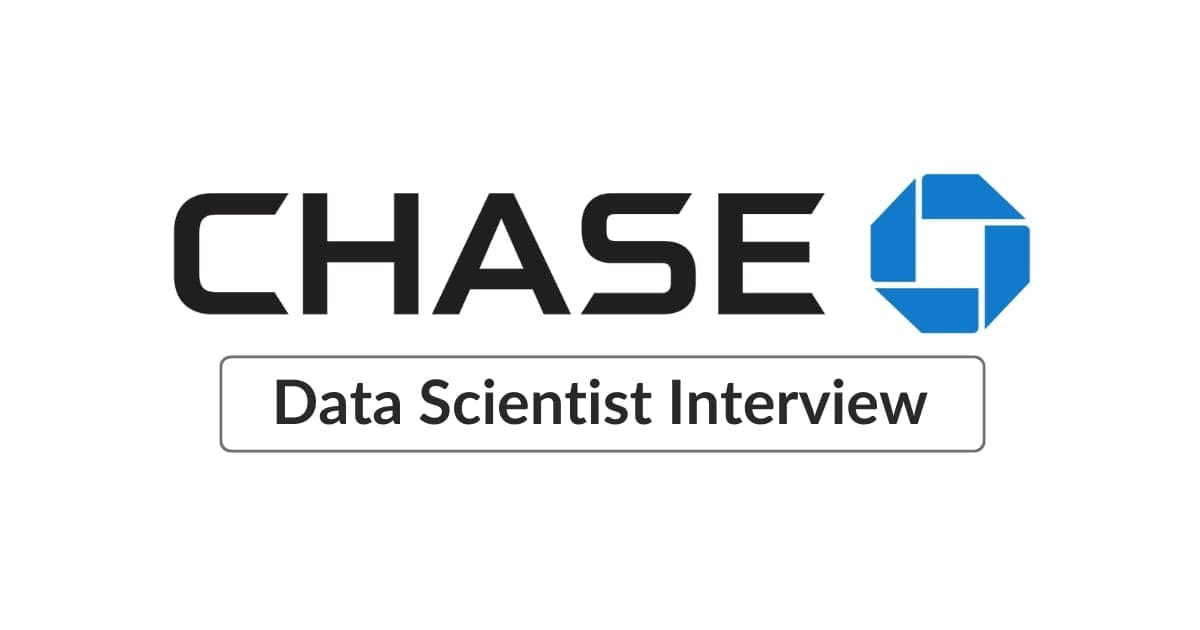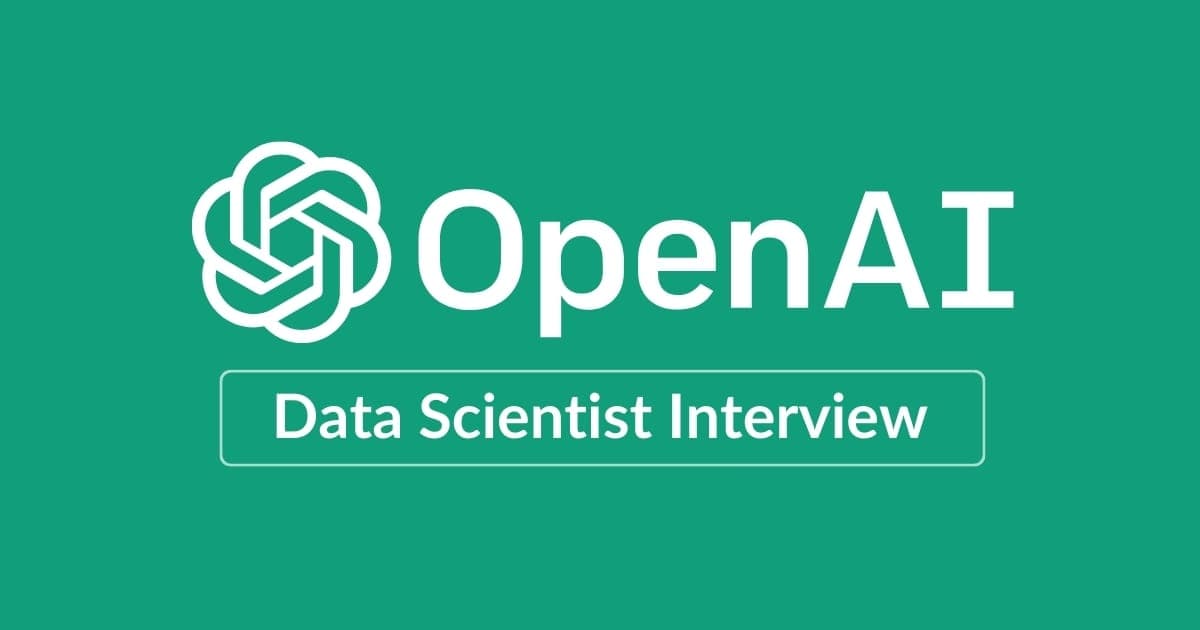Are you preparing for a Data Scientist interview at JPMorgan Chase? This comprehensive guide will provide you with insights into JPMorgan Chase’s interview process, key responsibilities of the role, and strategies to help you excel.
As a leading financial institution, JPMorgan Chase is at the forefront of leveraging data to drive innovation and enhance customer experiences. Understanding their unique approach to interviewing can give you a significant advantage, whether you are an experienced data professional or looking to advance your career.
In this blog, we will explore the structure of the interview process, the types of questions you can expect, and practical tips to help you navigate each stage with confidence.
Let’s dive in 👇
1. JPMorgan Chase Data Scientist Job
1.1 Role Overview
At JPMorgan Chase, Data Scientists play a pivotal role in transforming the financial industry through data-driven solutions and innovations. This position requires a combination of technical prowess, analytical skills, and a strategic mindset to derive insights that influence key business decisions. As a Data Scientist at JPMorgan Chase, you will work collaboratively with agile teams to tackle complex challenges and enhance customer and client experiences.
Key Responsibilities:
- Provide solutions and insights for complex and unstructured business-related problems through the use of data-driven techniques.
- Generate business results by owning the full-cycle of data analytics, including identifying issues and opportunities, mining and analyzing data, building models and algorithms to determine data patterns or trends, and delivering meaningful recommendations.
- Collaborate with data analytics, engineering, and product teams across various functions to develop technology and create solutions for financial challenges.
- Apply machine learning and artificial intelligence methods to solve problems across the firm.
- Ensure data quality, build robust pipelines, and create ETL processes to support analytics deliverables.
Skills and Qualifications:
- Proficiency in SQL, Python, and statistical analysis.
- Experience with machine learning algorithms and advanced data modeling techniques.
- Strong analytical and problem-solving skills to interpret complex data sets.
- Excellent communication skills to translate data insights into strategic recommendations.
- Ability to work collaboratively in a fast-paced, agile environment.
1.2 Compensation and Benefits
JPMorgan Chase offers a competitive compensation package for Data Scientists, reflecting its commitment to attracting and retaining top talent in the data and analytics field. The compensation structure includes a base salary, performance bonuses, and stock options, along with various benefits that support work-life balance and professional development.
Example Compensation Breakdown by Level:
| Level Name | Total Compensation | Base Salary | Stock (/yr) | Bonus |
|---|---|---|---|---|
| Data Scientist I (Analyst) | $104K | $100K | $39 | $4.4K |
| Data Scientist II (Associate) | $138K | $133K | $0 | $4.8K |
| Data Scientist III (Senior Associate) | $151K | $138K | $0 | $12.2K |
| Data Scientist IV (Vice President) | $220K | $171K | $2.7K | $46.3K |
Additional Benefits:
- Comprehensive health and wellness programs, including medical, dental, and vision coverage.
- Retirement savings plans with company matching contributions.
- Generous paid time off and flexible work arrangements.
- Professional development opportunities, including training and tuition reimbursement.
- Employee assistance programs and mental health resources.
Tips for Negotiation:
- Research compensation benchmarks for data scientist roles in your area to understand the market range.
- Consider the total compensation package, which includes stock options, bonuses, and benefits alongside the base salary.
- Highlight your unique skills and experiences during negotiations to maximize your offer.
JPMorgan Chase's compensation structure is designed to reward innovation, collaboration, and excellence in the field of data science. For more details, visit JPMorgan Chase’s careers page.
2. JPMorgan Chase Interview Process and Timeline
Average Timeline: 4-8 weeks
2.1 Application and Resume Screen (1-2 Weeks)
The first step in the JPMorgan Chase Data Scientist interview process is the application and resume review. Recruiters assess your qualifications to ensure they align with the role's requirements. Given the competitive nature of this stage, a well-crafted resume is essential.
What JPMorgan Chase Looks For:
- Strong proficiency in Python, SQL, and data analysis.
- Experience with machine learning models and financial data analysis.
- Projects demonstrating problem-solving skills and business impact.
- Excellent communication skills for cross-functional collaboration.
Tips for Success:
- Highlight experience with financial datasets, predictive modeling, or sentiment analysis.
- Emphasize projects involving machine learning, data visualization, or statistical analysis.
- Use keywords like "financial insights," "data-driven solutions," and "machine learning."
- Tailor your resume to reflect JPMorgan Chase's focus on innovation and financial expertise.
2.2 Recruiter Phone Screen (20-30 Minutes)
During this call, the recruiter will discuss your background, skills, and interest in JPMorgan Chase. They will provide an overview of the interview process and evaluate your fit for the Data Scientist role.
Example Questions:
- Can you describe a project where your data analysis influenced a financial decision?
- What tools do you use for data cleaning and analysis?
- How have you worked with cross-functional teams in the past?
Prepare a concise summary of your experience, focusing on key accomplishments and their impact on business outcomes.
2.3 Technical Screen (45-60 Minutes)
This stage assesses your technical skills and problem-solving abilities. It typically involves coding exercises, data analysis questions, and case-based discussions, often conducted via platforms like HireVue.
Focus Areas:
- SQL: Write queries using joins, aggregations, and window functions.
- Statistical Analysis: Explain concepts like regression, hypothesis testing, and probability.
- Machine Learning: Discuss model evaluation, feature engineering, and bias mitigation.
- Financial Data Analysis: Analyze data to generate insights and propose business recommendations.
Preparation Tips:
Practice SQL queries and data analysis scenarios relevant to financial datasets. Consider technical interview coaching for personalized guidance.
2.4 Onsite Interviews (3-5 Hours)
The onsite interview consists of multiple rounds with data scientists, managers, and cross-functional partners. Each round is designed to assess specific competencies.
Key Components:
- SQL and Coding Challenges: Solve exercises that test your ability to manipulate and analyze data.
- Real-World Business Problems: Address scenarios involving financial modeling, risk assessment, or customer analytics.
- Product Case Studies: Define metrics, evaluate performance, and propose data-driven improvements.
- Behavioral Interviews: Discuss past projects, teamwork, and adaptability to demonstrate cultural fit with JPMorgan Chase.
Preparation Tips:
- Review core data science topics, including statistical testing, machine learning algorithms, and financial data analysis.
- Research JPMorgan Chase's services and think about how data science can enhance their offerings.
- Practice clear communication of your solutions, emphasizing actionable insights.
For Personalized Guidance:
Consider mock interviews or coaching sessions to simulate the experience and receive tailored feedback. This can help you refine your responses and build confidence.
JPMorgan Chase Data Scientist Interview Questions
Probability & Statistics Questions
Probability and statistics questions assess your understanding of statistical methods and your ability to apply them to real-world data problems.
Example Questions:
- Explain the difference between a p-value and a confidence interval.
- How would you handle missing data in a dataset?
- What is the purpose of cross-validation in model evaluation?
- Describe a scenario where you would use a chi-square test.
- How do you interpret the results of a logistic regression model?
- What are the assumptions of linear regression?
- Explain the concept of overfitting and how you can prevent it.
For more on statistics, check out the Applied Statistics Course.
Machine Learning Questions
Machine learning questions evaluate your knowledge of algorithms, model building, and problem-solving techniques applicable to financial data.
Example Questions:
- Explain the difference between supervised and unsupervised learning.
- How would you address and rectify biases in a financial dataset?
- What are the benefits of feature scaling in a logistic regression model?
- Describe how an XGBoost model differs from a Random Forest model.
- How do you handle class imbalance in a dataset?
- What is the purpose of a confusion matrix?
- Explain the bias-variance tradeoff.
Enhance your machine learning skills with the Machine Learning Course.
Coding Questions
Coding questions test your ability to write efficient and effective code to solve data-related problems.
Example Questions:
- Write a Python function to calculate the factorial of a number.
- How would you implement a binary search algorithm?
- Write a function to reverse a string in Python.
- How do you handle exceptions in Python?
- Explain the concept of recursion with an example.
- Write a program to find the largest element in an array.
- How would you optimize a given piece of code for performance?
SQL Questions
SQL questions assess your ability to manipulate and analyze data using complex queries. Below are example tables JPMorgan Chase might use during the SQL round of the interview:
Transactions Table:
| TransactionID | UserID | Amount | TransactionDate | TransactionType |
|---|---|---|---|---|
| 1 | 101 | 500.00 | 2023-01-15 | Deposit |
| 2 | 102 | 200.00 | 2023-02-10 | Withdrawal |
| 3 | 103 | 1500.00 | 2023-03-05 | Deposit |
Accounts Table:
| AccountID | UserID | AccountType | Balance | OpenDate |
|---|---|---|---|---|
| 1 | 101 | Checking | 1000.00 | 2022-01-01 |
| 2 | 102 | Savings | 2500.00 | 2022-02-01 |
| 3 | 103 | Checking | 3000.00 | 2022-03-01 |
Example Questions:
- Total Deposits: Write a query to calculate the total amount of deposits for each user.
- Account Balances: Write a query to find users with a balance greater than $2000.
- Recent Transactions: Write a query to list all transactions that occurred in the last month.
- Transaction Types: Write a query to count the number of deposits and withdrawals for each user.
- Account Open Date: Write a query to find the earliest account open date for each user.
You can practice SQL questions on DataInterview SQL pad.
Behavioral Questions
Behavioral questions assess your ability to work collaboratively, navigate challenges, and align with JPMorgan Chase’s mission and values.
Example Questions:
- Describe a challenging data science project you handled. How did you manage the complexities, and what was the outcome?
- Why do you want to join JP Morgan?
- Tell us about a time when you had to explain complex data science concepts to non-technical stakeholders. How did you ensure they understood?
- How do you prioritize multiple deadlines?
- Can you provide an example of a time when you had to make a quick decision based on incomplete data?
4. How to Prepare for the JPMorgan Chase Data Scientist Interview
4.1 Understand JPMorgan Chase’s Business Model and Products
To excel in open-ended case studies at JPMorgan Chase, it’s crucial to understand their business model and product offerings. As a leading financial institution, JPMorgan Chase provides a wide range of services, including investment banking, asset management, and consumer banking.
Key Areas to Understand:
- Revenue Streams: How JPMorgan Chase generates income through interest, fees, and investment services.
- Customer Segments: The diverse clientele, ranging from individual consumers to large corporations.
- Product Offerings: Services like credit cards, mortgages, and wealth management.
Understanding these aspects will provide context for tackling business case questions, such as analyzing financial products or proposing data-driven strategies for customer engagement.
4.2 Master Financial Data Analysis
Proficiency in financial data analysis is essential for the Data Scientist role at JPMorgan Chase. You’ll need to interpret complex datasets and derive actionable insights.
Key Focus Areas:
- Financial Metrics: Understand key metrics like net interest margin, return on equity, and loan-to-value ratios.
- Data Visualization: Use tools like Tableau or Matplotlib to present data insights effectively.
- Predictive Modeling: Develop models to forecast financial trends and customer behavior.
These skills will help you navigate technical interviews and demonstrate your ability to drive business results through data.
Consider enrolling in our Data Scientist Interview Bootcamp for comprehensive preparation.
4.3 Enhance Your Machine Learning Skills
Machine learning is a critical component of the Data Scientist role at JPMorgan Chase. You’ll be expected to apply algorithms to solve complex financial problems.
Key Areas to Focus On:
- Algorithm Proficiency: Understand algorithms like decision trees, neural networks, and ensemble methods.
- Model Evaluation: Learn techniques for assessing model performance, such as cross-validation and AUC-ROC curves.
- Bias Mitigation: Develop strategies to identify and reduce bias in financial datasets.
Strengthening these skills will prepare you for machine learning questions and case studies during the interview process.
Explore our Machine Learning Engineer Bootcamp for advanced learning.
4.4 Refine Your SQL and Coding Skills
JPMorgan Chase places a strong emphasis on technical proficiency, making SQL and coding skills essential for success in their data science interviews.
Key Focus Areas:
- SQL Skills: Master complex queries involving joins, aggregations, and window functions.
- Python Proficiency: Focus on data manipulation with libraries like pandas and NumPy.
- Problem Solving: Practice coding challenges that test your ability to analyze and manipulate data.
These skills will help you tackle technical screens and demonstrate your ability to work with large datasets.
4.5 Practice with a Peer or Interview Coach
Simulating the interview experience can significantly improve your confidence and readiness. Mock interviews with a peer or coach can help you refine your answers and receive constructive feedback.
Tips:
- Practice structuring your answers for case studies and technical questions.
- Review common behavioral questions to align your responses with JPMorgan Chase’s values.
- Engage with professional coaching services for tailored, in-depth guidance and feedback.
Consider engaging with coaching platforms like DataInterview.com for tailored preparation. Mock interviews will help you build communication skills, anticipate potential challenges, and feel confident during JPMorgan Chase’s interview process.
5. FAQ
- What is the typical interview process for a Data Scientist at JPMorgan Chase?
The interview process generally includes a resume screening, a recruiter phone screen, a technical assessment, and onsite interviews. The entire process typically spans 4-8 weeks. - What skills are essential for a Data Scientist role at JPMorgan Chase?
Key skills include proficiency in SQL and Python, strong statistical analysis capabilities, experience with machine learning algorithms, and the ability to interpret complex financial datasets. - How can I prepare for the technical interviews?
Focus on practicing SQL queries, coding challenges in Python, and understanding machine learning concepts. Additionally, review statistical methods and financial data analysis techniques relevant to the banking sector. - What should I highlight in my resume for JPMorgan Chase?
Emphasize your experience with financial datasets, machine learning projects, and any impactful data-driven solutions you've developed. Tailor your resume to reflect your analytical skills and ability to collaborate in cross-functional teams. - How does JPMorgan Chase evaluate candidates during interviews?
Candidates are assessed on their technical skills, problem-solving abilities, and cultural fit. The interviewers look for a strong understanding of data science principles and the ability to apply them to real-world financial problems. - What is JPMorgan Chase’s mission?
JPMorgan Chase’s mission is "to be the best financial services firm in the world, serving clients and communities with excellence and integrity." - What are the compensation levels for Data Scientists at JPMorgan Chase?
Compensation for Data Scientists ranges from approximately $104K for entry-level positions to $220K for senior roles, including base salary, bonuses, and stock options. - What should I know about JPMorgan Chase’s business model for the interview?
Understanding JPMorgan Chase’s diverse services, including investment banking, asset management, and consumer banking, will be beneficial. Familiarity with their revenue streams and customer segments can help you tackle case study questions effectively. - What are some key metrics JPMorgan Chase tracks for success?
Key metrics include net interest margin, return on equity, customer acquisition costs, and overall profitability across different business lines. - How can I align my responses with JPMorgan Chase’s mission and values?
Highlight experiences that demonstrate your commitment to integrity, collaboration, and innovation. Discuss how your data-driven insights have positively impacted business outcomes or enhanced customer experiences.



